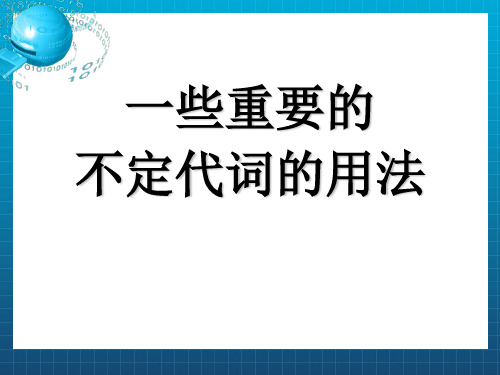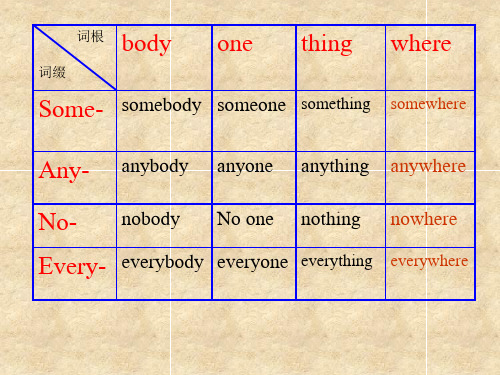不定代词的用法课件[1]1
合集下载
不定代词(常见普通不定代词)ppt课件

练习题及答案解析
01
02
答案
解析
C
形容词修饰不定代词时应后置,先排除B、D;anything一般用于疑
问句及否定句,something用于肯定句,也可用于表示请求、建议等
含义的疑问句中。本句是一个表示建议的疑问句,用something。
练习题及答案解析
练习题二:改错 ( ) 1. I have two children, and ________ of them are studying at college.
02
常见普通不定代词介绍
some与any
some
通常用于肯定句,表示“一些、某个” 。
例句
I have some books.(我有一些书。 )
any
通常用于否定句和疑问句,表示“任何 、一些”。
例句
Do you have any questions?(你有 任何问题吗?)
each与every
不定代词(常见普通不定代词 )ppt课件
目录
• 不定代词概述 • 常见普通不定代词介绍 • 不定代词用法详解 • 不定代词与其他词类的搭配 • 不定代词在句子中的位置及功能 • 总结与练习
01
不定代词概述
定义与分类
定义
不定代词是指不特定指代任何特定名词或名词词组的代词,其指代对象不确定 或不具体。
位于句尾
在某些情况下,不定代词可以位于句尾,作为句子的同位语或补语等, 例如,“They went to the party, everyone except me.”(除了我 以外,他们都去参加聚会了。)
在句子中的功能
充当主语
不定代词可以作为句子的主语,表示泛指的人或事物,例 如,“Everyone is entitled to their own opinion.”( 每个人都有权有自己的见解。)
不定代词的用法课件

A few of us speak English well. 我们中有几个人英语讲得 很好。
There were few eggs is the fridge, so he went to the sup ermarket and bought some. 冰箱里几乎没鸡蛋了,所以他去超 市买了一些。 3. few 作主语时,谓语动词仍用复数,例如:
每一个
≥2
单数
单数
every
每一个
≥3
单数
单数
both, either, neither
both为“两者都”,neither为“两者都不”,either为“两 者之一”。这三个单词都用于指两个人或物,在句中可作主语、宾 语和定语。 作主语: 1) Both (of them) enjoy the rice. 他们两人喜欢吃米饭。 2) Neither (of us) is a doctor. 我们俩都不是医生。 3) Either (of you) will go. 随你们哪个去都可以。
注意:作主语时,both后面的谓语动词用复数。neither, eit her后面的谓语动词一般用单数形式。 作定语: 1) Both Zhang Hua's father and mother worker work in a hos pital, but neither one is a doctor. 张华的父母亲在一所医院 工作,但都不是医生。
many / much
不定代词 both either
neither all
none
含义
两者都 两者中的任何
一个
两者都不
三者或三者以 上都
三者或三者以 上都不
数量 关系 =2 =2 =2 ≥3
There were few eggs is the fridge, so he went to the sup ermarket and bought some. 冰箱里几乎没鸡蛋了,所以他去超 市买了一些。 3. few 作主语时,谓语动词仍用复数,例如:
每一个
≥2
单数
单数
every
每一个
≥3
单数
单数
both, either, neither
both为“两者都”,neither为“两者都不”,either为“两 者之一”。这三个单词都用于指两个人或物,在句中可作主语、宾 语和定语。 作主语: 1) Both (of them) enjoy the rice. 他们两人喜欢吃米饭。 2) Neither (of us) is a doctor. 我们俩都不是医生。 3) Either (of you) will go. 随你们哪个去都可以。
注意:作主语时,both后面的谓语动词用复数。neither, eit her后面的谓语动词一般用单数形式。 作定语: 1) Both Zhang Hua's father and mother worker work in a hos pital, but neither one is a doctor. 张华的父母亲在一所医院 工作,但都不是医生。
many / much
不定代词 both either
neither all
none
含义
两者都 两者中的任何
一个
两者都不
三者或三者以 上都
三者或三者以 上都不
数量 关系 =2 =2 =2 ≥3
不定代词精品PPT课件

2024/1/24
10
修饰形容词或副词
常见的修饰形容词或副词的不定代词有
a little, much, many, few, little等。
例子
I have a little money left.(a little修饰money,表示“一点点钱”)
2024/1/24
11
表示数量或程度
常见的表示数量或程度的不定代词有
注重语境理解
在阅读和写作时,注意上下文语境,确保不定代词的正确使用。
遵循语法规则
严格遵守英语语法规则,避免在使用不定代词时出现语法错误。
22
05 练习题库及答案解析
2024/1/24
23
选择题
选择正确的不定代词 填空
根据句子语境选择恰 当的不定代词
2024/1/24
区分不同不定代词的 用法
24
填空题
分类
根据语义和用法,不 定代词可分为以下几 类
泛指代词
如some, any, none 等,用于泛指某人或 某物。
不定数量代词
如few, several, many等,表示数量 上的不确定性。
不定人称代词
如someone, everybody, no one 等,用于指代不特定 的人。
2024/1/24
案例二
探讨句子“I have nothing that belongs to me.”中不定代词 “nothing”与定语从句的关系及用 法。
2024/1/24
17
04 常见错误类型及纠正方 法
2024/1/24
18
误用相似词汇导致混淆
错误示例
将“some”和“any” 混用,导致句子意思不
不定代词的用法(课堂PPT)

本文详细介绍了不定代词的用法,首先ቤተ መጻሕፍቲ ባይዱ述了代词的分类,包括人称代词、反身代词、指示代词等,并重点强调了不定代词。列举了常见的不定代词,并从实际应用和理解的角度出发,深入学习了both, either, neither;one, another, the other;little, a little, few, a few以及some, any, no, none等不定代词的用法。详细阐述了这些不定代词的含义、数量关系、作定语时名词的数和作主语时动词的数等语法规则。同时,通过丰富的例句展示了这些不定代词在具体语境中的应用,如both作同位语时的三种句式位置,either在否定句中的副词用法,以及neither在倒装结构中的使用。这些内容对于理解和掌握不定代词的用法具有重要的指导意义。
不定代词用法ppt课件

为深入学习习近平新时代中国特色社 会主义 思想和 党的十 九大精 神,贯彻 全国教 育大会 精神,充 分发挥 中小学 图书室 育人功 能
作 文 点 评(范文)
Dear Emily,
I'm sorry to hear that you are ill again. My mom often tells something about how to stay healthy. I will tell you what she tells me. She often says, “Drink more milk and water.”She asks me to eat more fruit and vegetables. She says that I should eat vegetables at least three times a day . She also encourages me to go outside and play . I like to play basketball with my friends. Maybe you could do the same. I think my mom's advice is good . Maybe you can try the same and see if it helps. I hope you get well soon .
6、复合不定代词作主语时,谓语动词必须用单数形 式。
e.g : 1) Everything begins to grow in spring. 2) There is something new in today’s newspaper .
★7、复合不定副词在句子一般作状语。其他的用法与 不定代词相同。
初三-不定代词的用法总结-修正版PPT课件

both; all
none 没有一个 one other 其它的
.
3
(2)普通不定代词的用法
★ some与any
• 一般说来,some 用于肯定句中,any 用于否定句、疑问句和条件句中。如: • ①肯定句:He asked some questions. 他问了一些问题。 • ②否定句:He didn’t ask any questions. 他没有问任何问题。 • ③疑问句:Did he ask any questions? 他问了些问题没有? • 但是,在表示请求、邀请或征求意见的句子中,希望对方的肯定回答,通常要用 some 而
• There is only a little milk in the glass. • He has few friends. • They had little money with them. • 2)a little和little也可以用作副词,a little表示“有点,稍微”,
little表示“很少”。 • I'm a little hungry. (修饰形容词hungry) • Let him sleep a little. (修饰动词sleep) • Mary, go a little faster, please. (修饰副词比较级) • She slept very little last night.
.
4
• ★ many与much
• 两者意思相同,都表示“许多”,但用法不同,many用于修饰或代替可数名 词;而much用于修饰或代替不可数名词。如:
• ① Many trees fell in the storm. 在暴风雨中许多树倒了。 • ② Much money has been wasted that way. 很多钱都这样浪费了。
none 没有一个 one other 其它的
.
3
(2)普通不定代词的用法
★ some与any
• 一般说来,some 用于肯定句中,any 用于否定句、疑问句和条件句中。如: • ①肯定句:He asked some questions. 他问了一些问题。 • ②否定句:He didn’t ask any questions. 他没有问任何问题。 • ③疑问句:Did he ask any questions? 他问了些问题没有? • 但是,在表示请求、邀请或征求意见的句子中,希望对方的肯定回答,通常要用 some 而
• There is only a little milk in the glass. • He has few friends. • They had little money with them. • 2)a little和little也可以用作副词,a little表示“有点,稍微”,
little表示“很少”。 • I'm a little hungry. (修饰形容词hungry) • Let him sleep a little. (修饰动词sleep) • Mary, go a little faster, please. (修饰副词比较级) • She slept very little last night.
.
4
• ★ many与much
• 两者意思相同,都表示“许多”,但用法不同,many用于修饰或代替可数名 词;而much用于修饰或代替不可数名词。如:
• ① Many trees fell in the storm. 在暴风雨中许多树倒了。 • ② Much money has been wasted that way. 很多钱都这样浪费了。
不定代词用法详解ppt课件

• Only a few people can solve this problem. 只有几个人能解决这个问题。
• Few of them want to go. 他们中几乎没有人想去。
• A few of them want to go. 他们中有几个人想去。
• (2) little“没有多少”,a little“少量”,修饰不可数名词;a little表示肯定意义, little表示否定意义。
9
• 4) everyone, everybody(每个人)和 everything(每样东西,一切事物)。 • She said good-bye to everyone. 她和每个人告别。 • Everybody's business is nobody's business. 事关大家无人管。 • Everything is ready for the experiment. 实验的一切都准备好了。 • This news means everything to us. 这个消息对我们至关重要。
7
• (5) the others表示同类中余下的全部。 • The search party was divided into two groups. Some went to the right, the
others went to the left. 搜寻小组一分为二,一部分人向右,另一部分向左。 • Jenny is cleverer than any of. the others in her class. 珍妮比班上的其他(任何)人
不定代词用法详解
1
• 1. some,any • (1) some多用于肯定句,修饰复数可数名词和不可数名词,作“一些”解。它还可修饰
不定代词的用法 ppt课件

注意:作主语时,both后面的谓语动词用复数。neither, either后 面的谓语动词一般用单数形式。 作定语:
1) Both Zhang Hua's father and mother worker work in a hospital,
but neither one is a doctor. 张华的父母亲在一所医院工作,但都不
一些重要的 不定代词的用法
2020/12/27
1
不定代词有both, either, neither, one,
the other, another, little, few, some, any, each, every, no, none等,从实际应用和理 解出发,重点学习以下几个:
(一) both, either, neither (二) one, another, the other (三) little, a little, few, a few (四) some / any, no / none, each / every,
2. few, a few 用来修饰可数名词,前者表示否定,后者表示肯定。
A few of us speak English well. 我们中有几个人英语讲得很好。
There were few eggs is the fridge, so he went to the supermarket
and bought some. 冰箱里几乎没鸡蛋了,所以他去超市买了一些。
3. few 作主语时,谓语动词仍用复数,例如:
Few men know this, do they?
4. 常用词组有 quite a few (好几个),only a few (只有一个),a very
1) Both Zhang Hua's father and mother worker work in a hospital,
but neither one is a doctor. 张华的父母亲在一所医院工作,但都不
一些重要的 不定代词的用法
2020/12/27
1
不定代词有both, either, neither, one,
the other, another, little, few, some, any, each, every, no, none等,从实际应用和理 解出发,重点学习以下几个:
(一) both, either, neither (二) one, another, the other (三) little, a little, few, a few (四) some / any, no / none, each / every,
2. few, a few 用来修饰可数名词,前者表示否定,后者表示肯定。
A few of us speak English well. 我们中有几个人英语讲得很好。
There were few eggs is the fridge, so he went to the supermarket
and bought some. 冰箱里几乎没鸡蛋了,所以他去超市买了一些。
3. few 作主语时,谓语动词仍用复数,例如:
Few men know this, do they?
4. 常用词组有 quite a few (好几个),only a few (只有一个),a very
- 1、下载文档前请自行甄别文档内容的完整性,平台不提供额外的编辑、内容补充、找答案等附加服务。
- 2、"仅部分预览"的文档,不可在线预览部分如存在完整性等问题,可反馈申请退款(可完整预览的文档不适用该条件!)。
- 3、如文档侵犯您的权益,请联系客服反馈,我们会尽快为您处理(人工客服工作时间:9:00-18:30)。
作宾语:
1) I like both of the toys very much. 我非常喜欢这两件玩具。 2) The boy could find neither of them and went away. 这男孩找不到
他们俩就走开了。
3) You may plant either in the street. 你可以种在街道的任一边。 both 还可作同位语,它们句中的位置是在动词be,助动词或情态动 词的后面,但在实义动词前面。 1) They are both in good health. 他们两人身体都很好。
一些重要的 不定代词的用法
不定代词有both, either, neither, one, the other, another, little, few, some, any, each, every, no, none等,从实际应用和理 解出发,重点学习以下几个: (一) both, either, neither (二) one, another, the other (三) little, a little, few, a few (四) some / any, no / none, each / every, many / much
3. another 还有 “再……” 的意思,例如: Have another cup of coffee, please. 再喝一杯咖啡吧! She could have to stay here for another week. 他将在这里再待一个 星期。 4. other 有 “另外” 的含义。例如: Where are the other students? 其他学生在哪里? The boy is much cleverer than the other two. 这孩子比另两个更聪 明。 5. others 和 the others 表示复数的泛指和特指。例如: In the park some are playing games. Others are walking near the river. I have five colour pencils. One is red, another is blue and the others are green. 6. the rest 也可作 “其余的” 解释。它用作主语时注意谓语动词的单 复数。例如: The rest of his life was spent in America. 他的余生是在美国度过的。 He has eight books. Two are in English. The rest are in Chinese. 他 有几本书,两本是英文,其余的是中文。
≥3
≥2
○
单数
every
每一个
≥3
单数
单数
both, either, neither both 为 “ 两者都 ” , neither 为“ 两者都不 ” , either 为“ 两者之一 ” 。这 三个单词都用于指两个人或物,在句中可作主语、宾语和定语。 作主语: 1) Both (of them) enjoyed the rice. 他们两人喜欢吃米饭。 2) Neither (of us) is a doctor. 我们俩都不是医生。 3) Either (of you) will go. 随你们哪个去都可以。 注意:作主语时,both后面的谓语动词用复数。neither, either后 面的谓语动词一般用单数形式。 作定语: 1) Both Zhang Hua's father and mother worker work in a hospital, but neither one is a doctor. 张华的父母亲在一所医院工作,但都不 是医生。 2) You may take either apple. 两个苹果任你拿一个。
some, any, no, none, each, every, many, much
(1)some 和 any: some (一些,某个) 句中可作主语、宾语、定语等,常用于肯定句。 作定语时,它可修饰可数名词和不可数名词,可数名词是单数时, some 表示 “某个” 的意思。例如: There are some newspapers on the table. I am going to buy some orange juice. Have you any questions? Yes, I have some. I have read that in some magazine. 当说活者表示提议、请求或期望得到肯定回答时,在疑问句中 也可用 some。例如: Would you like some tea? Could you lend me some money? any “一些” 用法相同于 some, 但多用于疑问句、否定句或条件从句。 例如: Is there any ink in your pen? Put up your hands if you have any questions.
(3)each 和 every : each (每个,各自的) 强调个体,可作主语、宾语、定语、同位语。 every (每个,一切的) 相当于all,强调整体,只能作定语。 Each boy has a dictionary. 每个孩子都有一本词典。 Every boy has a dictionary. 所有的孩子都有一本词典。 注意: every 构成的常用词组 every other day 每隔一天 / every other five days 每隔五天 every other line 每隔一行 / every five days 每五天 (4)many 和 much : many 修饰可数名词的复数,谓语用复数,much 修饰不可数名词, 谓语用单数,它们可用在肯定句、否定句和疑问句中,还可在肯定 句中作主语或修饰主语。例如: So much for today. There are many buses and cars in the street. many 已被 a lot of, a large number of, a great many 所代替。 much 已被 a lot of, plenty of, a good deal of, a great (large) quantity of 所代替。 但 a lot of / lots of 只能用于肯定句。
不定代词
含义
数量 关系
作定语时 名词的数
作主语时 动词的数
both either
neither all
两者都 两者中的任何 一个
两者都不 三者或三者以 上都 三者或三者以 上都不 每一个
=2 =2
=2 ≥3
复数 单数
单数 单数或复 数
复数 单数
单数 单数或复 数 单数或复 数 le, few, a few
1. little 与 a little 两者都用来修饰不可数名词,little 作 “很少”,“几 乎没有” 解,有否定的意思,a little 作 “少许”、“有一点” 解,有肯 定的意思,例如: In this way they can make the trip with just a little money. 用这种 方法他们只花很少的钱就能旅行。 There is little left, is there? 没剩多少了,是吗? 2. few, a few 用来修饰可数名词,前者表示否定,后者表示肯定。 A few of us speak English well. 我们中有几个人英语讲得很好。 There were few eggs is the fridge, so he went to the supermarket and bought some. 冰箱里几乎没鸡蛋了,所以他去超市买了一些。 3. few 作主语时,谓语动词仍用复数,例如: Few men know this, do they? 4. 常用词组有 quite a few (好几个),only a few (只有一个),a very few (极少数)。例如: He studied Chinese for quite a few years. 他学汉语已有好几年了。
(2)no 和 none: none (没有一个,全不,都不) 是名词性的不定代词,可作主语和宾 语,常和 of 短语连用,不可作定语。none 作主语代替不可数名词 时,谓语用单数形式。代替可数名词时,谓语用单、复数均可。例 如: None of us is / are from Beijing. None of the money is mine. none 与 all 相对,有 “全不” “全部” 的含义,因此 all 是全肯定, none 是 all 的全部否定,但都指三者以上的人或物。 We all made mistakes. None of us was correct. no 是形容词性的不定代词,只能用作定语,可修饰可数和不可数 名词。no 等于 not a 或 not any 加上名词。例如: I have no money. I have not any money. no one 相当于 nobody,意为没有人,谓语用单数。
one, another, the other 1. one 常用来作代词,替代前文所出现的可数名词,表示人或物, 以避免重复。例如: I haven't got a ball pen. I'll have to buy one. (= a ball pen) 我没圆珠 笔,我得去买一支。 He is one to think more of others. 他是个能多为别人着想的人。 2. the other, another 都可解释为 “另一个”。other 加上定冠词用于两 者中的另一个,another 指三者以上中的另一个。例如: He was two brothers. One is a doctor, the other is a teacher. We've received two parcels, one from my uncle, the other from my aunt. I don't like this one, show me another, please. I've just bought three things. One is a walkman, another is a pocket calculator, the third is a video game.
